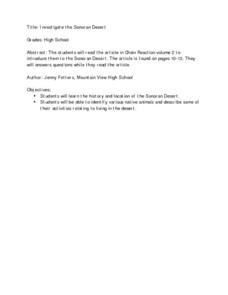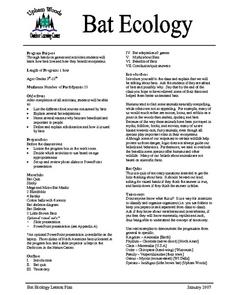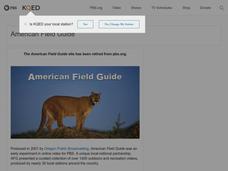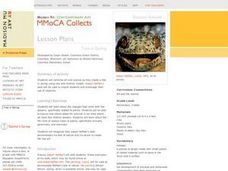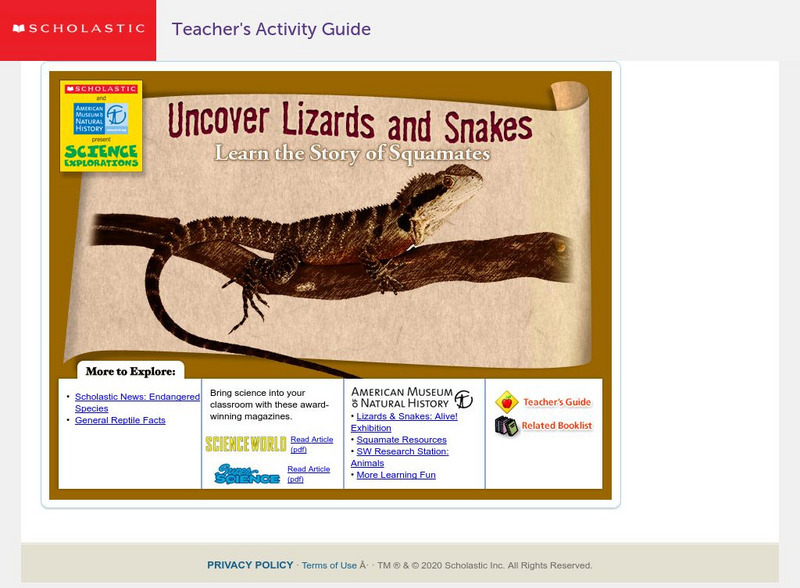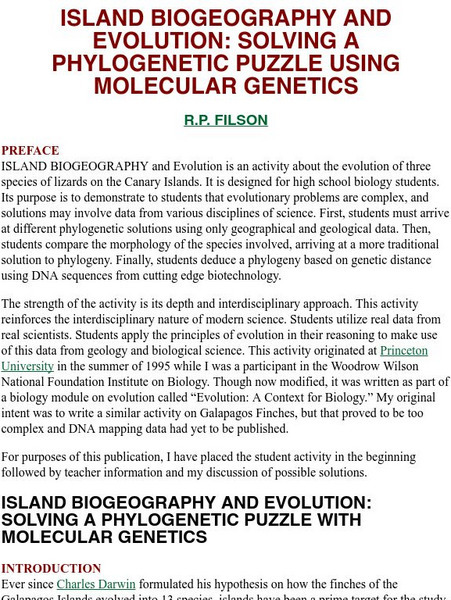Florida Center for Reading Research
Phonological Awareness
Kindergarteners and first graders alike are engaged as they learn the initial sounds of objects by taking turns flipping cards to form a long train. This complete and ready-to-print activity helps young ones build the basic foundations...
Curated OER
Investigate the Sonoran Desert
Young scholars read article in Chain Reaction about the Sonoran Desert and answer questions.
Curated OER
Habitats
Students examine how different living things interact with their environment. As a class, they discuss the characteristics of a habitat and write the list on the board. In groups, they focus on one habitat and create a mural of the...
Curated OER
Bat Ecology
Young scholars, through hands on games and activities, discover how bats live and how bats benefit ecosystems. They play a game designed to show them how echolocation works and another to show how mother bats locate their young through...
Curated OER
The Formation and Value of Temperate Grasslands
Students get an overview of the climate and organisms of the North American Prairie. After a lecture, and watching some videos imbedded in this plan, students compile research data on the North American Prairie.
Curated OER
Feral Cats
In this geography instructional activity, students identify the feral cats of Australia. They read an excerpt and respond to the three questions that follow. Students also imagine that they are a part of scientific team that has been set...
Curated OER
Animals Multiple Choice Definitions Worksheet
In this animal vocabulary worksheet, students complete multiple choice questions where they define the animal terms given to them. Students complete 7 questions.
Curated OER
What's Up at the Rim?
Students are sent on a scavenger hunt to find as many plants as they can in nature.
Curated OER
Investigation 12 - Amphibians & Reptiles
Fourth graders compare and contrast the behavior and structure of amphibians and reptiles of Utah. The Division of Wildlife Resources website is an important resource for them to access, for information as well as colorful pictures of...
Curated OER
Environment: Understanding Climate Impacts
Students investigate the potential environmental consequences of climate change. They conduct Internet research to discover how climate change may impact certain species of animals and present their findings in a poster or skit. Students...
Curated OER
The Desert Biome
Students create a visual presentation of the characteristics of a biome. Working in small groups, students use traditional and online resources to gather data concerning biomes. Students use their information to create a bulletin board...
Curated OER
Quiz
In this quiz worksheet, students, after researching and discussing different types of world-wide animals, determine the answers to ten key true and false questions.
Curated OER
Olympics
Students rotate through a variety of Olympic activities and record their results. Teams rotate through stations and practice units of measurement.
Curated OER
Ambush Warriors
Middle schoolers identify four different categories of reptiles and explain how snakes deliver their venom to their prey.
Curated OER
Tree in Spring
Students use examples of Joseph Raffael's art of nature to create an all-school mosaic of a tree in spring using clay.
Curated OER
Animals in Japan
Students compare and contrast common animals children love and have as pets in Japan and America in this early elementary lesson. The culminating project is an original work of art by each student depicting an animal of their choice.
Curated OER
How to Keep Warm in the Arctic!
Learners simulate the differences between animals protected by fat and those that aren't. They fill one of the mugs with shortening. Students cut a small hole, and place a thermometer in each piece of cardboard. They position the bulb of...
PBS
Pbs Learning Media: Wild Kratts: All About Lizards Lesson Plan
Students explore the diversity of lizards in terms of characteristics, behavior, and habitat. Activities feature five species of lizards and their special body structures needed for survival.
San Diego Zoo Global
San Diego Zoo: Lizard
This resource provides extensive information about lizards, including photos and an audio clip.
Scholastic
Scholastic: Science Explorations: Uncover Lizards and Snakes
An exploration of squamates, or scaled reptiles. Take notes about lizards and snakes using the pdf "Squamate Chart" while viewing a slideshow, investigate the squamate anatomy and how squamates differ from other animals, such as insects...
Howard Hughes Medical Institute
Hhmi: Bio Interactive: Lizard Evolution Virtual Lab
Students explore the evolution of the anole lizard in this virtual lab. Students will collect and analyze data during the virtual lab that focuses on evolutionary biology and includes adaptation, convergent evolution, phylogenetic...
Denver Zoo
Denver Zoo: Frilled Lizard
The Denver Zoo features a comprehensive overview of the frilled lizard focusing on its habitat, range, adaptations, diet, physical characteristics, and more.
Encyclopedia of Earth
Encyclopedia of Earth: Adaptations of Desert Amphibians and Reptiles
The evolution of amphibians from prehistoric days is described, and the challenges they face when living in a desert environment, of which the ability to reproduce is the greatest. How they manage to survive in a desert is explained in...
University of California
Ucmp: Island Biogeography and Evolution
This is a lesson designed by a biology teacher. In it, students use maps and evidence of island age, molecular genetics, morphology, and distance apart to determine how the islands came to be occupied by different species of lizards. It...



